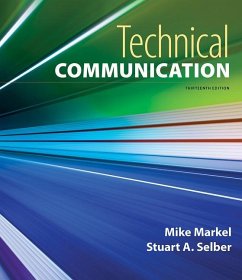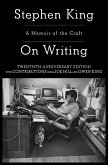- Broschiertes Buch
- Merkliste
- Auf die Merkliste
- Bewerten Bewerten
- Teilen
- Produkt teilen
- Produkterinnerung
- Produkterinnerung
Make the leap from writing in college to writing in a variety of workplace settings and contexts with Technical Communication. Practical advice and real-world examples let you practice with the kinds of writing processes and products you'll encounter on the job.
Andere Kunden interessierten sich auch für
![English Academic Writing English Academic Writing]() Gerlinde MautnerEnglish Academic Writing29,90 €
Gerlinde MautnerEnglish Academic Writing29,90 €![On Writing On Writing]() Stephen KingOn Writing15,99 €
Stephen KingOn Writing15,99 €![Contemporary Publishing and the Culture of Books Contemporary Publishing and the Culture of Books]() Contemporary Publishing and the Culture of Books51,99 €
Contemporary Publishing and the Culture of Books51,99 €![Frei geschrieben Frei geschrieben]() Judith WolfsbergerFrei geschrieben21,00 €
Judith WolfsbergerFrei geschrieben21,00 €![Unless It Moves the Human Heart Unless It Moves the Human Heart]() Roger RosenblattUnless It Moves the Human Heart15,99 €
Roger RosenblattUnless It Moves the Human Heart15,99 €![Erfolgreich schreiben im Beruf Erfolgreich schreiben im Beruf]() Norbert FranckErfolgreich schreiben im Beruf22,00 €
Norbert FranckErfolgreich schreiben im Beruf22,00 €![Gregg Shorthand: A Light-Line Phonography for the Million Gregg Shorthand: A Light-Line Phonography for the Million]() John Robert GreggGregg Shorthand: A Light-Line Phonography for the Million18,99 €
John Robert GreggGregg Shorthand: A Light-Line Phonography for the Million18,99 €-
-
-
Make the leap from writing in college to writing in a variety of workplace settings and contexts with Technical Communication. Practical advice and real-world examples let you practice with the kinds of writing processes and products you'll encounter on the job.
Produktdetails
- Produktdetails
- Verlag: Bedford Books
- 13th edition
- Seitenzahl: 768
- Erscheinungstermin: 11. September 2020
- Englisch
- Abmessung: 229mm x 198mm x 23mm
- Gewicht: 1089g
- ISBN-13: 9781319245009
- ISBN-10: 1319245005
- Artikelnr.: 60361419
- Herstellerkennzeichnung
- Libri GmbH
- Europaallee 1
- 36244 Bad Hersfeld
- gpsr@libri.de
- Verlag: Bedford Books
- 13th edition
- Seitenzahl: 768
- Erscheinungstermin: 11. September 2020
- Englisch
- Abmessung: 229mm x 198mm x 23mm
- Gewicht: 1089g
- ISBN-13: 9781319245009
- ISBN-10: 1319245005
- Artikelnr.: 60361419
- Herstellerkennzeichnung
- Libri GmbH
- Europaallee 1
- 36244 Bad Hersfeld
- gpsr@libri.de
Part 1 Understanding the Technical Communication Environment
1. Introduction to Technical Communication
* What Is Technical Communication?
* Why Technical Communication Skills Are Important in Your Career
* The Challenges of Producing Technical Communication
* Characteristics of a Technical Document
* Skills and Qualities Shared by Successful Workplace Communicators
* Exercises
2. Understanding Ethical and Legal Considerations
1. A Brief Introduction to Ethics
2. Your Ethical Obligations
3. Obligations to Your Employer
4. Obligations to the Public
5. Obligations to the Environment
6. Your Legal Obligations
7. The Role of Corporate Culture in Ethical and Legal Conduct
8. Understanding Ethical and Legal Issues Related to Social Media
9. Communicating Ethically Across Cultures
10. Communicating with Cultures with Different Ethical Beliefs
11. Communicating in Countries with Different Laws
12. Principles for Ethical Communication
* Abide by Relevant Laws
* Abide by the Appropriate Professional Code of Conduct
* Abide by Your Organization's Policy on Social Media
* Take Advantage of Your Employer's Ethics Resources
* Tell the Truth
* Don't Mislead Your Readers
* Use Design to Highlight Important Ethical and Legal Information
* Be Clear
* Avoid Discriminatory Language
* Acknowledge Assistance from Others
13. Writer's Checklist
14. Exercises
3. Writing Technical Documents
15. Planning
* Generating Ideas About Your Subject
* Researching Additional Information
* Devising a Schedule and a Budget
16. Drafting
* Using Templates
17. Revising
* Studying the Draft by Yourself
* Seeking Help from Technology
18. Editing
19. Proofreading
20. Writer's Checklist
21. Exercises
4. Writing Collaboratively
22. Advantages and Disadvantages of Collaboration
* Advantages of Collaboration
* Disadvantages of Collaboration
23. Managing Projects
24. Conducting Meetings
25. Listening Effectively
26. Setting Your Team's Agenda
27. Conducting Efficient Meetings
28. Communicating Diplomatically
29. Critiquing a Team Member's Work
30. Using Electronic Tools in Collaboration
* Word-Processing Tools
* Messaging Tools
* Videoconferencing Tools
* Wikis and Shared Document Workspaces
* Crowdsourcing Platforms
31. Gender and Collaboration
32. Culture and Collaboration
33. Writer's Checklist
34. Exercises
Part 2 Planning the Document
5. Analyzing Your Audience and Purpose
35. Understanding Audience and Purpose
36. Using an Audience Profile Sheet
37. Determining the Important Characteristics of Your Audience
* Who Are Your Readers?
* Why Is Your Audience Reading Your Document?
* What Are Your Readers' Attitudes and Expectations?
* How Will Your Readers Use Your Document?
38. Techniques for Learning About Your Audience
* Determining What You Already Know About Your Audience
* Interviewing People
* Reading About Your Audience Online
* Searching Social Media
* Analyzing Social-Media Data
* Using Artificial Intelligence Tools
39. Communicating Across Cultures
* Understanding Cultural Variables "on the Surface"
* Understanding Cultural Variables "Beneath the Surface"
* Considering Cultural Variables as You Write
40. Using Graphics and Design for Multicultural Readers
41. Applying What You Have Learned About Your Audience
42. Writing for Multiple Audiences
43. Determining Your Purpose
44. Gaining Management's Approval
45. Revising Information for a New Audience and Purpose
46. Writer's Checklist
47. Exercises
6. Researching Your Subject
48. Understanding the Research Process
49. Choosing Appropriate Research Methods
* Conducting Secondary Research
* Understanding Research Tools
* Types of Secondary Research Sources
* Using Social Media and Other Interactive Resources
* Using AI Chatbots
50. Evaluating the Information
51. Conducting Primary Research
* Analysis of Social-Media Data
* Observations and Demonstrations
* Inspections
* Experiments
* Field Research
* Interviews
* Inquiries
* Questionnaires
52. Writer's Checklist
53. Exercises
7. Organizing Your Information
54. Understanding Three Principles for Organizing Technical Information
55. Analyzing Your Audience and Purpose
56. Using Conventional Patterns of Organization
57. Displaying Your Organizational Pattern Prominently
58. Understanding Conventional Organizational Patterns
* Chronological
* Spatial
* More Important to Less Important
* Comparison and Contrast
* Problem-Methods-Solution
* Cause and Effect
59. Writer's Checklist
60. Exercises
Part 3 Developing and Testing the Verbal and Visual Information
8. Communicating Persuasively
61. Considering the Context of Your Argument
62. Understanding Your Audience's Broader Goals
63. Working Within Constraints
64. Crafting a Persuasive Argument
* Identifying the Elements of Your Argument
* Considering Opposing Viewpoints
* Using the Right Kinds of Evidence
* Using visuals as persuasive elements
* Appealing to Emotions Responsibly
* Deciding Where to Present the Claim
* Understanding the Role of Culture in Persuasion
* Avoiding Logical Fallacies
* Presenting Yourself Effectively
65. Writer's Checklist
66. Exercises
9. Emphasizing Important Information
67. Writing Clear, Informative Titles
68. Writing Clear, Informative Headings
69. Writing Clear, Informative Lists
* Write Effective Paragraph Lists
* Write Effective Sentence Lists
70. Writing Clear, Informative Paragraphs
* Structure Paragraphs Clearly
* Use Coherence Devices Within and Between Paragraphs
71. Writer's Checklist
72. Exercises
10. Writing Correct and Effective Sentences
73. Writing Grammatically Correct Sentences
* Avoid Sentence Fragments
* Avoid Comma Splices
* Avoid Run-on Sentences
* Avoid Ambiguous Pronoun References
* Compare Items Clearly
* Use Adjectives Clearly
* Maintain Subject-Verb Agreement
* Maintain Pronoun-Antecedent Agreement
* Use Tenses Correctly
74. Structuring Effective Sentences
* Emphasize New and Important Information
* Choose an Appropriate Sentence Length
* Focus on the "Real" Subject
* Focus on the "Real" Verb
* Use Parallel Structure
* Use Modifiers Effectively
75. Choosing the Right Words and Phrases
* Select an Appropriate Level of Formality
* Be Clear
* Understanding Simplified English for Nonnative Speakers
* Preparing Text for Translation
76. Writer's Checklist
77. Exercises
11. Designing Print and Digital Documents
78. Goals of Document Design
79. Understanding Design Principles
80. Planning Your Design
* Analyze Your Audience and Purpose
* Determine Your Resources
81. Designing Print Documents
* Size
* Paper
* Bindings
* NAVIGATIONAL AIDS
* Designing Print Pages
* Page Layout
* Other Design Features
82. Designing Digital Documents
* Use Design To Emphasize Important Information
* Create Informative Headers and Footers
* Help Readers Navigate the Document
* Include Extra Features Your Readers Might Need
* Help Readers Connect with Others
83. Designing Digital Pages
* Aim for Simplicity
84. Writer's Checklist
85. Exercises
12. Creating Graphics
86. The Functions of Graphics
87. The Characteristics of an Effective Graphic
88. Understanding the Process of Creating Graphics
* Planning Graphics
* Producing Graphics
* Revising Graphics
89. Citing Sources of Graphics
90. Using Color Effectively
91. Choosing the Appropriate Kind of Graphic
* Illustrating Numerical Information
* Illustrating Logical Relationships
* Illustrating Process Descriptions and Instructions
* Illustrating Visual and Spatial Characteristics
92. Creating Effective Graphics for Multicultural Readers
93. Writer's Checklist
94. Exercises
13. Evaluating and Testing Technical Documents
95. Understanding Usability Studies
96. Assessing the need for a Usability Study
97. Determining the Goals of the Study
98. Studying Existing Documents Versus Prototypes
99. Considering Study Settings
100. Conducting Guided Evaluations of Technical Documents
* Choosing Document Evaluators
* Establishing Evaluation Guidelines
* Preparing Materials for the Evaluation
101. Testing Documents in a Controlled Setting
* Preparing for the Test
* Conducting the Test
102. Testing Documents in Context
* Preparing for a Site Visit
* Conducting a Test in Context
* Monitoring Documents Remotely
103. Interpreting and Reporting Your Findings
104. Writer's Checklist
105. Exercises
Part 4 Learning Important Applications
14. Corresponding in Print and Online
106. Understanding the Process of Writing Correspondence
107. Selecting a Type of Correspondence
108. Presenting Yourself Effectively in Correspondence
* Use the Appropriate Level of Formality
* Communicate Correctly
* Project the "You Attitude"
* Avoid Correspondence Clichés
* Communicate Honestly
109. Writing Letters
* Elements of a Letter
* Common Types of Letters
110. Writing Memos
111. Writing Emails
112. Writing Social-Media Posts
113. Writing Correspondence to Multicultural Readers
114. Writer's Checklist
115. Exercises
15. Applying for a Job
116. Understanding the Job-Application Process
117. Establishing Your Professional Brand
118. Finding the Right Position
119. Planning The Job Search
120. Understanding Job-Search Strategies
121. Writing Résumés
* Considering Nontraditional Résumés
122. Writing Job-Application Letters
123. Preparing for a Job Interview
124. Following Up After an Interview
125. Writer's Checklist
126. Exercises
16. Writing Proposals
127. Understanding the Process of Writing Proposals
128. The Logistics of Proposals
* The "Deliverables" of Proposals
129. Persuasion and Proposals
* Writing a Proposal
130. The Structure of the Proposal
131. Sample Internal Proposal
132. Writer's Checklist
133. Exercises
17. Writing Informational Reports
134. Understanding the Process of Writing Informational Reports
135. Sample Progress Report
* Writing Incident Reports
* Writing Meeting Minutes
136. Writer's Checklist
137. Exercises
18. Writing Recommendation Reports
* Understanding the Role of Recommendation Reports
* Using a Problem-Solving Model for Preparing Recommendation Reports
* Writing Recommendation Reports
* Sample Recommendation Report
* Writer's Checklist
* Exercises
19. Writing Lab Reports
* Persuasion and Lab Reports
* Understanding the Process of Writing Lab Reports
* Understanding the Structure of the Lab Report
* Understanding the Role of Science and Engineering Articles
* Sample Lab Report
* Writer's Checklist
* Exercises
20 Writing Definitions, Descriptions, and Instructions
* Writing Definitions
* Analyzing the Writing Situation for Definitions
* Determining the Kind of Definition To Write
* Deciding Where To Place the Definition
* Writing Descriptions
* Analyzing the Writing Situation for Descriptions
* Indicating Clearly the Nature and Scope of the Description
* Introducing the Description Clearly
* Providing Appropriate Detail
* Ending the Description with a Brief Conclusion
* A Look at Several Sample Descriptions
* Writing Instructions
* Understanding the Role of Instructional Videos
* Designing a Set of Written Instructions
* Revising, Editing, and Proofreading Instructions
* A Look at Several Sample Sets of Instructions
* Writing Manuals
* Writer's Checklist
* Exercises
21 Making Oral Presentations
* Understanding the Role of Oral Presentations
* Understanding the Process of Preparing and Delivering an Oral
Presentation
* Preparing the Presentation
* Analyzing the Speaking Situation
* Organizing and Developing the Presentation
* Preparing Presentation Graphics
* Choosing Effective Language
* Rehearsing the Presentation
* Delivering the Presentation
* Calming Your Nerves
* Using Your Voice Effectively
* Using Your Body Effectively
* Answering Questions After a Presentation
* Sample Evaluation Form
* Speaker's Checklist
* Exercises
APPENDIX Reference Handbook
138. A Skimming Your Sources and Taking Notes
* Paraphrasing
139. B Documenting Your Sources
* APA Style
* IEEE Style
* MLA Style
140. C Editing and Proofreading Your Documents
* Punctuation
141. D Guidelines for Multilingual Writers (ESL)
* Cultural and Stylistic Communication Issues
1. Introduction to Technical Communication
* What Is Technical Communication?
* Why Technical Communication Skills Are Important in Your Career
* The Challenges of Producing Technical Communication
* Characteristics of a Technical Document
* Skills and Qualities Shared by Successful Workplace Communicators
* Exercises
2. Understanding Ethical and Legal Considerations
1. A Brief Introduction to Ethics
2. Your Ethical Obligations
3. Obligations to Your Employer
4. Obligations to the Public
5. Obligations to the Environment
6. Your Legal Obligations
7. The Role of Corporate Culture in Ethical and Legal Conduct
8. Understanding Ethical and Legal Issues Related to Social Media
9. Communicating Ethically Across Cultures
10. Communicating with Cultures with Different Ethical Beliefs
11. Communicating in Countries with Different Laws
12. Principles for Ethical Communication
* Abide by Relevant Laws
* Abide by the Appropriate Professional Code of Conduct
* Abide by Your Organization's Policy on Social Media
* Take Advantage of Your Employer's Ethics Resources
* Tell the Truth
* Don't Mislead Your Readers
* Use Design to Highlight Important Ethical and Legal Information
* Be Clear
* Avoid Discriminatory Language
* Acknowledge Assistance from Others
13. Writer's Checklist
14. Exercises
3. Writing Technical Documents
15. Planning
* Generating Ideas About Your Subject
* Researching Additional Information
* Devising a Schedule and a Budget
16. Drafting
* Using Templates
17. Revising
* Studying the Draft by Yourself
* Seeking Help from Technology
18. Editing
19. Proofreading
20. Writer's Checklist
21. Exercises
4. Writing Collaboratively
22. Advantages and Disadvantages of Collaboration
* Advantages of Collaboration
* Disadvantages of Collaboration
23. Managing Projects
24. Conducting Meetings
25. Listening Effectively
26. Setting Your Team's Agenda
27. Conducting Efficient Meetings
28. Communicating Diplomatically
29. Critiquing a Team Member's Work
30. Using Electronic Tools in Collaboration
* Word-Processing Tools
* Messaging Tools
* Videoconferencing Tools
* Wikis and Shared Document Workspaces
* Crowdsourcing Platforms
31. Gender and Collaboration
32. Culture and Collaboration
33. Writer's Checklist
34. Exercises
Part 2 Planning the Document
5. Analyzing Your Audience and Purpose
35. Understanding Audience and Purpose
36. Using an Audience Profile Sheet
37. Determining the Important Characteristics of Your Audience
* Who Are Your Readers?
* Why Is Your Audience Reading Your Document?
* What Are Your Readers' Attitudes and Expectations?
* How Will Your Readers Use Your Document?
38. Techniques for Learning About Your Audience
* Determining What You Already Know About Your Audience
* Interviewing People
* Reading About Your Audience Online
* Searching Social Media
* Analyzing Social-Media Data
* Using Artificial Intelligence Tools
39. Communicating Across Cultures
* Understanding Cultural Variables "on the Surface"
* Understanding Cultural Variables "Beneath the Surface"
* Considering Cultural Variables as You Write
40. Using Graphics and Design for Multicultural Readers
41. Applying What You Have Learned About Your Audience
42. Writing for Multiple Audiences
43. Determining Your Purpose
44. Gaining Management's Approval
45. Revising Information for a New Audience and Purpose
46. Writer's Checklist
47. Exercises
6. Researching Your Subject
48. Understanding the Research Process
49. Choosing Appropriate Research Methods
* Conducting Secondary Research
* Understanding Research Tools
* Types of Secondary Research Sources
* Using Social Media and Other Interactive Resources
* Using AI Chatbots
50. Evaluating the Information
51. Conducting Primary Research
* Analysis of Social-Media Data
* Observations and Demonstrations
* Inspections
* Experiments
* Field Research
* Interviews
* Inquiries
* Questionnaires
52. Writer's Checklist
53. Exercises
7. Organizing Your Information
54. Understanding Three Principles for Organizing Technical Information
55. Analyzing Your Audience and Purpose
56. Using Conventional Patterns of Organization
57. Displaying Your Organizational Pattern Prominently
58. Understanding Conventional Organizational Patterns
* Chronological
* Spatial
* More Important to Less Important
* Comparison and Contrast
* Problem-Methods-Solution
* Cause and Effect
59. Writer's Checklist
60. Exercises
Part 3 Developing and Testing the Verbal and Visual Information
8. Communicating Persuasively
61. Considering the Context of Your Argument
62. Understanding Your Audience's Broader Goals
63. Working Within Constraints
64. Crafting a Persuasive Argument
* Identifying the Elements of Your Argument
* Considering Opposing Viewpoints
* Using the Right Kinds of Evidence
* Using visuals as persuasive elements
* Appealing to Emotions Responsibly
* Deciding Where to Present the Claim
* Understanding the Role of Culture in Persuasion
* Avoiding Logical Fallacies
* Presenting Yourself Effectively
65. Writer's Checklist
66. Exercises
9. Emphasizing Important Information
67. Writing Clear, Informative Titles
68. Writing Clear, Informative Headings
69. Writing Clear, Informative Lists
* Write Effective Paragraph Lists
* Write Effective Sentence Lists
70. Writing Clear, Informative Paragraphs
* Structure Paragraphs Clearly
* Use Coherence Devices Within and Between Paragraphs
71. Writer's Checklist
72. Exercises
10. Writing Correct and Effective Sentences
73. Writing Grammatically Correct Sentences
* Avoid Sentence Fragments
* Avoid Comma Splices
* Avoid Run-on Sentences
* Avoid Ambiguous Pronoun References
* Compare Items Clearly
* Use Adjectives Clearly
* Maintain Subject-Verb Agreement
* Maintain Pronoun-Antecedent Agreement
* Use Tenses Correctly
74. Structuring Effective Sentences
* Emphasize New and Important Information
* Choose an Appropriate Sentence Length
* Focus on the "Real" Subject
* Focus on the "Real" Verb
* Use Parallel Structure
* Use Modifiers Effectively
75. Choosing the Right Words and Phrases
* Select an Appropriate Level of Formality
* Be Clear
* Understanding Simplified English for Nonnative Speakers
* Preparing Text for Translation
76. Writer's Checklist
77. Exercises
11. Designing Print and Digital Documents
78. Goals of Document Design
79. Understanding Design Principles
80. Planning Your Design
* Analyze Your Audience and Purpose
* Determine Your Resources
81. Designing Print Documents
* Size
* Paper
* Bindings
* NAVIGATIONAL AIDS
* Designing Print Pages
* Page Layout
* Other Design Features
82. Designing Digital Documents
* Use Design To Emphasize Important Information
* Create Informative Headers and Footers
* Help Readers Navigate the Document
* Include Extra Features Your Readers Might Need
* Help Readers Connect with Others
83. Designing Digital Pages
* Aim for Simplicity
84. Writer's Checklist
85. Exercises
12. Creating Graphics
86. The Functions of Graphics
87. The Characteristics of an Effective Graphic
88. Understanding the Process of Creating Graphics
* Planning Graphics
* Producing Graphics
* Revising Graphics
89. Citing Sources of Graphics
90. Using Color Effectively
91. Choosing the Appropriate Kind of Graphic
* Illustrating Numerical Information
* Illustrating Logical Relationships
* Illustrating Process Descriptions and Instructions
* Illustrating Visual and Spatial Characteristics
92. Creating Effective Graphics for Multicultural Readers
93. Writer's Checklist
94. Exercises
13. Evaluating and Testing Technical Documents
95. Understanding Usability Studies
96. Assessing the need for a Usability Study
97. Determining the Goals of the Study
98. Studying Existing Documents Versus Prototypes
99. Considering Study Settings
100. Conducting Guided Evaluations of Technical Documents
* Choosing Document Evaluators
* Establishing Evaluation Guidelines
* Preparing Materials for the Evaluation
101. Testing Documents in a Controlled Setting
* Preparing for the Test
* Conducting the Test
102. Testing Documents in Context
* Preparing for a Site Visit
* Conducting a Test in Context
* Monitoring Documents Remotely
103. Interpreting and Reporting Your Findings
104. Writer's Checklist
105. Exercises
Part 4 Learning Important Applications
14. Corresponding in Print and Online
106. Understanding the Process of Writing Correspondence
107. Selecting a Type of Correspondence
108. Presenting Yourself Effectively in Correspondence
* Use the Appropriate Level of Formality
* Communicate Correctly
* Project the "You Attitude"
* Avoid Correspondence Clichés
* Communicate Honestly
109. Writing Letters
* Elements of a Letter
* Common Types of Letters
110. Writing Memos
111. Writing Emails
112. Writing Social-Media Posts
113. Writing Correspondence to Multicultural Readers
114. Writer's Checklist
115. Exercises
15. Applying for a Job
116. Understanding the Job-Application Process
117. Establishing Your Professional Brand
118. Finding the Right Position
119. Planning The Job Search
120. Understanding Job-Search Strategies
121. Writing Résumés
* Considering Nontraditional Résumés
122. Writing Job-Application Letters
123. Preparing for a Job Interview
124. Following Up After an Interview
125. Writer's Checklist
126. Exercises
16. Writing Proposals
127. Understanding the Process of Writing Proposals
128. The Logistics of Proposals
* The "Deliverables" of Proposals
129. Persuasion and Proposals
* Writing a Proposal
130. The Structure of the Proposal
131. Sample Internal Proposal
132. Writer's Checklist
133. Exercises
17. Writing Informational Reports
134. Understanding the Process of Writing Informational Reports
135. Sample Progress Report
* Writing Incident Reports
* Writing Meeting Minutes
136. Writer's Checklist
137. Exercises
18. Writing Recommendation Reports
* Understanding the Role of Recommendation Reports
* Using a Problem-Solving Model for Preparing Recommendation Reports
* Writing Recommendation Reports
* Sample Recommendation Report
* Writer's Checklist
* Exercises
19. Writing Lab Reports
* Persuasion and Lab Reports
* Understanding the Process of Writing Lab Reports
* Understanding the Structure of the Lab Report
* Understanding the Role of Science and Engineering Articles
* Sample Lab Report
* Writer's Checklist
* Exercises
20 Writing Definitions, Descriptions, and Instructions
* Writing Definitions
* Analyzing the Writing Situation for Definitions
* Determining the Kind of Definition To Write
* Deciding Where To Place the Definition
* Writing Descriptions
* Analyzing the Writing Situation for Descriptions
* Indicating Clearly the Nature and Scope of the Description
* Introducing the Description Clearly
* Providing Appropriate Detail
* Ending the Description with a Brief Conclusion
* A Look at Several Sample Descriptions
* Writing Instructions
* Understanding the Role of Instructional Videos
* Designing a Set of Written Instructions
* Revising, Editing, and Proofreading Instructions
* A Look at Several Sample Sets of Instructions
* Writing Manuals
* Writer's Checklist
* Exercises
21 Making Oral Presentations
* Understanding the Role of Oral Presentations
* Understanding the Process of Preparing and Delivering an Oral
Presentation
* Preparing the Presentation
* Analyzing the Speaking Situation
* Organizing and Developing the Presentation
* Preparing Presentation Graphics
* Choosing Effective Language
* Rehearsing the Presentation
* Delivering the Presentation
* Calming Your Nerves
* Using Your Voice Effectively
* Using Your Body Effectively
* Answering Questions After a Presentation
* Sample Evaluation Form
* Speaker's Checklist
* Exercises
APPENDIX Reference Handbook
138. A Skimming Your Sources and Taking Notes
* Paraphrasing
139. B Documenting Your Sources
* APA Style
* IEEE Style
* MLA Style
140. C Editing and Proofreading Your Documents
* Punctuation
141. D Guidelines for Multilingual Writers (ESL)
* Cultural and Stylistic Communication Issues
Part 1 Understanding the Technical Communication Environment
1. Introduction to Technical Communication
* What Is Technical Communication?
* Why Technical Communication Skills Are Important in Your Career
* The Challenges of Producing Technical Communication
* Characteristics of a Technical Document
* Skills and Qualities Shared by Successful Workplace Communicators
* Exercises
2. Understanding Ethical and Legal Considerations
1. A Brief Introduction to Ethics
2. Your Ethical Obligations
3. Obligations to Your Employer
4. Obligations to the Public
5. Obligations to the Environment
6. Your Legal Obligations
7. The Role of Corporate Culture in Ethical and Legal Conduct
8. Understanding Ethical and Legal Issues Related to Social Media
9. Communicating Ethically Across Cultures
10. Communicating with Cultures with Different Ethical Beliefs
11. Communicating in Countries with Different Laws
12. Principles for Ethical Communication
* Abide by Relevant Laws
* Abide by the Appropriate Professional Code of Conduct
* Abide by Your Organization's Policy on Social Media
* Take Advantage of Your Employer's Ethics Resources
* Tell the Truth
* Don't Mislead Your Readers
* Use Design to Highlight Important Ethical and Legal Information
* Be Clear
* Avoid Discriminatory Language
* Acknowledge Assistance from Others
13. Writer's Checklist
14. Exercises
3. Writing Technical Documents
15. Planning
* Generating Ideas About Your Subject
* Researching Additional Information
* Devising a Schedule and a Budget
16. Drafting
* Using Templates
17. Revising
* Studying the Draft by Yourself
* Seeking Help from Technology
18. Editing
19. Proofreading
20. Writer's Checklist
21. Exercises
4. Writing Collaboratively
22. Advantages and Disadvantages of Collaboration
* Advantages of Collaboration
* Disadvantages of Collaboration
23. Managing Projects
24. Conducting Meetings
25. Listening Effectively
26. Setting Your Team's Agenda
27. Conducting Efficient Meetings
28. Communicating Diplomatically
29. Critiquing a Team Member's Work
30. Using Electronic Tools in Collaboration
* Word-Processing Tools
* Messaging Tools
* Videoconferencing Tools
* Wikis and Shared Document Workspaces
* Crowdsourcing Platforms
31. Gender and Collaboration
32. Culture and Collaboration
33. Writer's Checklist
34. Exercises
Part 2 Planning the Document
5. Analyzing Your Audience and Purpose
35. Understanding Audience and Purpose
36. Using an Audience Profile Sheet
37. Determining the Important Characteristics of Your Audience
* Who Are Your Readers?
* Why Is Your Audience Reading Your Document?
* What Are Your Readers' Attitudes and Expectations?
* How Will Your Readers Use Your Document?
38. Techniques for Learning About Your Audience
* Determining What You Already Know About Your Audience
* Interviewing People
* Reading About Your Audience Online
* Searching Social Media
* Analyzing Social-Media Data
* Using Artificial Intelligence Tools
39. Communicating Across Cultures
* Understanding Cultural Variables "on the Surface"
* Understanding Cultural Variables "Beneath the Surface"
* Considering Cultural Variables as You Write
40. Using Graphics and Design for Multicultural Readers
41. Applying What You Have Learned About Your Audience
42. Writing for Multiple Audiences
43. Determining Your Purpose
44. Gaining Management's Approval
45. Revising Information for a New Audience and Purpose
46. Writer's Checklist
47. Exercises
6. Researching Your Subject
48. Understanding the Research Process
49. Choosing Appropriate Research Methods
* Conducting Secondary Research
* Understanding Research Tools
* Types of Secondary Research Sources
* Using Social Media and Other Interactive Resources
* Using AI Chatbots
50. Evaluating the Information
51. Conducting Primary Research
* Analysis of Social-Media Data
* Observations and Demonstrations
* Inspections
* Experiments
* Field Research
* Interviews
* Inquiries
* Questionnaires
52. Writer's Checklist
53. Exercises
7. Organizing Your Information
54. Understanding Three Principles for Organizing Technical Information
55. Analyzing Your Audience and Purpose
56. Using Conventional Patterns of Organization
57. Displaying Your Organizational Pattern Prominently
58. Understanding Conventional Organizational Patterns
* Chronological
* Spatial
* More Important to Less Important
* Comparison and Contrast
* Problem-Methods-Solution
* Cause and Effect
59. Writer's Checklist
60. Exercises
Part 3 Developing and Testing the Verbal and Visual Information
8. Communicating Persuasively
61. Considering the Context of Your Argument
62. Understanding Your Audience's Broader Goals
63. Working Within Constraints
64. Crafting a Persuasive Argument
* Identifying the Elements of Your Argument
* Considering Opposing Viewpoints
* Using the Right Kinds of Evidence
* Using visuals as persuasive elements
* Appealing to Emotions Responsibly
* Deciding Where to Present the Claim
* Understanding the Role of Culture in Persuasion
* Avoiding Logical Fallacies
* Presenting Yourself Effectively
65. Writer's Checklist
66. Exercises
9. Emphasizing Important Information
67. Writing Clear, Informative Titles
68. Writing Clear, Informative Headings
69. Writing Clear, Informative Lists
* Write Effective Paragraph Lists
* Write Effective Sentence Lists
70. Writing Clear, Informative Paragraphs
* Structure Paragraphs Clearly
* Use Coherence Devices Within and Between Paragraphs
71. Writer's Checklist
72. Exercises
10. Writing Correct and Effective Sentences
73. Writing Grammatically Correct Sentences
* Avoid Sentence Fragments
* Avoid Comma Splices
* Avoid Run-on Sentences
* Avoid Ambiguous Pronoun References
* Compare Items Clearly
* Use Adjectives Clearly
* Maintain Subject-Verb Agreement
* Maintain Pronoun-Antecedent Agreement
* Use Tenses Correctly
74. Structuring Effective Sentences
* Emphasize New and Important Information
* Choose an Appropriate Sentence Length
* Focus on the "Real" Subject
* Focus on the "Real" Verb
* Use Parallel Structure
* Use Modifiers Effectively
75. Choosing the Right Words and Phrases
* Select an Appropriate Level of Formality
* Be Clear
* Understanding Simplified English for Nonnative Speakers
* Preparing Text for Translation
76. Writer's Checklist
77. Exercises
11. Designing Print and Digital Documents
78. Goals of Document Design
79. Understanding Design Principles
80. Planning Your Design
* Analyze Your Audience and Purpose
* Determine Your Resources
81. Designing Print Documents
* Size
* Paper
* Bindings
* NAVIGATIONAL AIDS
* Designing Print Pages
* Page Layout
* Other Design Features
82. Designing Digital Documents
* Use Design To Emphasize Important Information
* Create Informative Headers and Footers
* Help Readers Navigate the Document
* Include Extra Features Your Readers Might Need
* Help Readers Connect with Others
83. Designing Digital Pages
* Aim for Simplicity
84. Writer's Checklist
85. Exercises
12. Creating Graphics
86. The Functions of Graphics
87. The Characteristics of an Effective Graphic
88. Understanding the Process of Creating Graphics
* Planning Graphics
* Producing Graphics
* Revising Graphics
89. Citing Sources of Graphics
90. Using Color Effectively
91. Choosing the Appropriate Kind of Graphic
* Illustrating Numerical Information
* Illustrating Logical Relationships
* Illustrating Process Descriptions and Instructions
* Illustrating Visual and Spatial Characteristics
92. Creating Effective Graphics for Multicultural Readers
93. Writer's Checklist
94. Exercises
13. Evaluating and Testing Technical Documents
95. Understanding Usability Studies
96. Assessing the need for a Usability Study
97. Determining the Goals of the Study
98. Studying Existing Documents Versus Prototypes
99. Considering Study Settings
100. Conducting Guided Evaluations of Technical Documents
* Choosing Document Evaluators
* Establishing Evaluation Guidelines
* Preparing Materials for the Evaluation
101. Testing Documents in a Controlled Setting
* Preparing for the Test
* Conducting the Test
102. Testing Documents in Context
* Preparing for a Site Visit
* Conducting a Test in Context
* Monitoring Documents Remotely
103. Interpreting and Reporting Your Findings
104. Writer's Checklist
105. Exercises
Part 4 Learning Important Applications
14. Corresponding in Print and Online
106. Understanding the Process of Writing Correspondence
107. Selecting a Type of Correspondence
108. Presenting Yourself Effectively in Correspondence
* Use the Appropriate Level of Formality
* Communicate Correctly
* Project the "You Attitude"
* Avoid Correspondence Clichés
* Communicate Honestly
109. Writing Letters
* Elements of a Letter
* Common Types of Letters
110. Writing Memos
111. Writing Emails
112. Writing Social-Media Posts
113. Writing Correspondence to Multicultural Readers
114. Writer's Checklist
115. Exercises
15. Applying for a Job
116. Understanding the Job-Application Process
117. Establishing Your Professional Brand
118. Finding the Right Position
119. Planning The Job Search
120. Understanding Job-Search Strategies
121. Writing Résumés
* Considering Nontraditional Résumés
122. Writing Job-Application Letters
123. Preparing for a Job Interview
124. Following Up After an Interview
125. Writer's Checklist
126. Exercises
16. Writing Proposals
127. Understanding the Process of Writing Proposals
128. The Logistics of Proposals
* The "Deliverables" of Proposals
129. Persuasion and Proposals
* Writing a Proposal
130. The Structure of the Proposal
131. Sample Internal Proposal
132. Writer's Checklist
133. Exercises
17. Writing Informational Reports
134. Understanding the Process of Writing Informational Reports
135. Sample Progress Report
* Writing Incident Reports
* Writing Meeting Minutes
136. Writer's Checklist
137. Exercises
18. Writing Recommendation Reports
* Understanding the Role of Recommendation Reports
* Using a Problem-Solving Model for Preparing Recommendation Reports
* Writing Recommendation Reports
* Sample Recommendation Report
* Writer's Checklist
* Exercises
19. Writing Lab Reports
* Persuasion and Lab Reports
* Understanding the Process of Writing Lab Reports
* Understanding the Structure of the Lab Report
* Understanding the Role of Science and Engineering Articles
* Sample Lab Report
* Writer's Checklist
* Exercises
20 Writing Definitions, Descriptions, and Instructions
* Writing Definitions
* Analyzing the Writing Situation for Definitions
* Determining the Kind of Definition To Write
* Deciding Where To Place the Definition
* Writing Descriptions
* Analyzing the Writing Situation for Descriptions
* Indicating Clearly the Nature and Scope of the Description
* Introducing the Description Clearly
* Providing Appropriate Detail
* Ending the Description with a Brief Conclusion
* A Look at Several Sample Descriptions
* Writing Instructions
* Understanding the Role of Instructional Videos
* Designing a Set of Written Instructions
* Revising, Editing, and Proofreading Instructions
* A Look at Several Sample Sets of Instructions
* Writing Manuals
* Writer's Checklist
* Exercises
21 Making Oral Presentations
* Understanding the Role of Oral Presentations
* Understanding the Process of Preparing and Delivering an Oral
Presentation
* Preparing the Presentation
* Analyzing the Speaking Situation
* Organizing and Developing the Presentation
* Preparing Presentation Graphics
* Choosing Effective Language
* Rehearsing the Presentation
* Delivering the Presentation
* Calming Your Nerves
* Using Your Voice Effectively
* Using Your Body Effectively
* Answering Questions After a Presentation
* Sample Evaluation Form
* Speaker's Checklist
* Exercises
APPENDIX Reference Handbook
138. A Skimming Your Sources and Taking Notes
* Paraphrasing
139. B Documenting Your Sources
* APA Style
* IEEE Style
* MLA Style
140. C Editing and Proofreading Your Documents
* Punctuation
141. D Guidelines for Multilingual Writers (ESL)
* Cultural and Stylistic Communication Issues
1. Introduction to Technical Communication
* What Is Technical Communication?
* Why Technical Communication Skills Are Important in Your Career
* The Challenges of Producing Technical Communication
* Characteristics of a Technical Document
* Skills and Qualities Shared by Successful Workplace Communicators
* Exercises
2. Understanding Ethical and Legal Considerations
1. A Brief Introduction to Ethics
2. Your Ethical Obligations
3. Obligations to Your Employer
4. Obligations to the Public
5. Obligations to the Environment
6. Your Legal Obligations
7. The Role of Corporate Culture in Ethical and Legal Conduct
8. Understanding Ethical and Legal Issues Related to Social Media
9. Communicating Ethically Across Cultures
10. Communicating with Cultures with Different Ethical Beliefs
11. Communicating in Countries with Different Laws
12. Principles for Ethical Communication
* Abide by Relevant Laws
* Abide by the Appropriate Professional Code of Conduct
* Abide by Your Organization's Policy on Social Media
* Take Advantage of Your Employer's Ethics Resources
* Tell the Truth
* Don't Mislead Your Readers
* Use Design to Highlight Important Ethical and Legal Information
* Be Clear
* Avoid Discriminatory Language
* Acknowledge Assistance from Others
13. Writer's Checklist
14. Exercises
3. Writing Technical Documents
15. Planning
* Generating Ideas About Your Subject
* Researching Additional Information
* Devising a Schedule and a Budget
16. Drafting
* Using Templates
17. Revising
* Studying the Draft by Yourself
* Seeking Help from Technology
18. Editing
19. Proofreading
20. Writer's Checklist
21. Exercises
4. Writing Collaboratively
22. Advantages and Disadvantages of Collaboration
* Advantages of Collaboration
* Disadvantages of Collaboration
23. Managing Projects
24. Conducting Meetings
25. Listening Effectively
26. Setting Your Team's Agenda
27. Conducting Efficient Meetings
28. Communicating Diplomatically
29. Critiquing a Team Member's Work
30. Using Electronic Tools in Collaboration
* Word-Processing Tools
* Messaging Tools
* Videoconferencing Tools
* Wikis and Shared Document Workspaces
* Crowdsourcing Platforms
31. Gender and Collaboration
32. Culture and Collaboration
33. Writer's Checklist
34. Exercises
Part 2 Planning the Document
5. Analyzing Your Audience and Purpose
35. Understanding Audience and Purpose
36. Using an Audience Profile Sheet
37. Determining the Important Characteristics of Your Audience
* Who Are Your Readers?
* Why Is Your Audience Reading Your Document?
* What Are Your Readers' Attitudes and Expectations?
* How Will Your Readers Use Your Document?
38. Techniques for Learning About Your Audience
* Determining What You Already Know About Your Audience
* Interviewing People
* Reading About Your Audience Online
* Searching Social Media
* Analyzing Social-Media Data
* Using Artificial Intelligence Tools
39. Communicating Across Cultures
* Understanding Cultural Variables "on the Surface"
* Understanding Cultural Variables "Beneath the Surface"
* Considering Cultural Variables as You Write
40. Using Graphics and Design for Multicultural Readers
41. Applying What You Have Learned About Your Audience
42. Writing for Multiple Audiences
43. Determining Your Purpose
44. Gaining Management's Approval
45. Revising Information for a New Audience and Purpose
46. Writer's Checklist
47. Exercises
6. Researching Your Subject
48. Understanding the Research Process
49. Choosing Appropriate Research Methods
* Conducting Secondary Research
* Understanding Research Tools
* Types of Secondary Research Sources
* Using Social Media and Other Interactive Resources
* Using AI Chatbots
50. Evaluating the Information
51. Conducting Primary Research
* Analysis of Social-Media Data
* Observations and Demonstrations
* Inspections
* Experiments
* Field Research
* Interviews
* Inquiries
* Questionnaires
52. Writer's Checklist
53. Exercises
7. Organizing Your Information
54. Understanding Three Principles for Organizing Technical Information
55. Analyzing Your Audience and Purpose
56. Using Conventional Patterns of Organization
57. Displaying Your Organizational Pattern Prominently
58. Understanding Conventional Organizational Patterns
* Chronological
* Spatial
* More Important to Less Important
* Comparison and Contrast
* Problem-Methods-Solution
* Cause and Effect
59. Writer's Checklist
60. Exercises
Part 3 Developing and Testing the Verbal and Visual Information
8. Communicating Persuasively
61. Considering the Context of Your Argument
62. Understanding Your Audience's Broader Goals
63. Working Within Constraints
64. Crafting a Persuasive Argument
* Identifying the Elements of Your Argument
* Considering Opposing Viewpoints
* Using the Right Kinds of Evidence
* Using visuals as persuasive elements
* Appealing to Emotions Responsibly
* Deciding Where to Present the Claim
* Understanding the Role of Culture in Persuasion
* Avoiding Logical Fallacies
* Presenting Yourself Effectively
65. Writer's Checklist
66. Exercises
9. Emphasizing Important Information
67. Writing Clear, Informative Titles
68. Writing Clear, Informative Headings
69. Writing Clear, Informative Lists
* Write Effective Paragraph Lists
* Write Effective Sentence Lists
70. Writing Clear, Informative Paragraphs
* Structure Paragraphs Clearly
* Use Coherence Devices Within and Between Paragraphs
71. Writer's Checklist
72. Exercises
10. Writing Correct and Effective Sentences
73. Writing Grammatically Correct Sentences
* Avoid Sentence Fragments
* Avoid Comma Splices
* Avoid Run-on Sentences
* Avoid Ambiguous Pronoun References
* Compare Items Clearly
* Use Adjectives Clearly
* Maintain Subject-Verb Agreement
* Maintain Pronoun-Antecedent Agreement
* Use Tenses Correctly
74. Structuring Effective Sentences
* Emphasize New and Important Information
* Choose an Appropriate Sentence Length
* Focus on the "Real" Subject
* Focus on the "Real" Verb
* Use Parallel Structure
* Use Modifiers Effectively
75. Choosing the Right Words and Phrases
* Select an Appropriate Level of Formality
* Be Clear
* Understanding Simplified English for Nonnative Speakers
* Preparing Text for Translation
76. Writer's Checklist
77. Exercises
11. Designing Print and Digital Documents
78. Goals of Document Design
79. Understanding Design Principles
80. Planning Your Design
* Analyze Your Audience and Purpose
* Determine Your Resources
81. Designing Print Documents
* Size
* Paper
* Bindings
* NAVIGATIONAL AIDS
* Designing Print Pages
* Page Layout
* Other Design Features
82. Designing Digital Documents
* Use Design To Emphasize Important Information
* Create Informative Headers and Footers
* Help Readers Navigate the Document
* Include Extra Features Your Readers Might Need
* Help Readers Connect with Others
83. Designing Digital Pages
* Aim for Simplicity
84. Writer's Checklist
85. Exercises
12. Creating Graphics
86. The Functions of Graphics
87. The Characteristics of an Effective Graphic
88. Understanding the Process of Creating Graphics
* Planning Graphics
* Producing Graphics
* Revising Graphics
89. Citing Sources of Graphics
90. Using Color Effectively
91. Choosing the Appropriate Kind of Graphic
* Illustrating Numerical Information
* Illustrating Logical Relationships
* Illustrating Process Descriptions and Instructions
* Illustrating Visual and Spatial Characteristics
92. Creating Effective Graphics for Multicultural Readers
93. Writer's Checklist
94. Exercises
13. Evaluating and Testing Technical Documents
95. Understanding Usability Studies
96. Assessing the need for a Usability Study
97. Determining the Goals of the Study
98. Studying Existing Documents Versus Prototypes
99. Considering Study Settings
100. Conducting Guided Evaluations of Technical Documents
* Choosing Document Evaluators
* Establishing Evaluation Guidelines
* Preparing Materials for the Evaluation
101. Testing Documents in a Controlled Setting
* Preparing for the Test
* Conducting the Test
102. Testing Documents in Context
* Preparing for a Site Visit
* Conducting a Test in Context
* Monitoring Documents Remotely
103. Interpreting and Reporting Your Findings
104. Writer's Checklist
105. Exercises
Part 4 Learning Important Applications
14. Corresponding in Print and Online
106. Understanding the Process of Writing Correspondence
107. Selecting a Type of Correspondence
108. Presenting Yourself Effectively in Correspondence
* Use the Appropriate Level of Formality
* Communicate Correctly
* Project the "You Attitude"
* Avoid Correspondence Clichés
* Communicate Honestly
109. Writing Letters
* Elements of a Letter
* Common Types of Letters
110. Writing Memos
111. Writing Emails
112. Writing Social-Media Posts
113. Writing Correspondence to Multicultural Readers
114. Writer's Checklist
115. Exercises
15. Applying for a Job
116. Understanding the Job-Application Process
117. Establishing Your Professional Brand
118. Finding the Right Position
119. Planning The Job Search
120. Understanding Job-Search Strategies
121. Writing Résumés
* Considering Nontraditional Résumés
122. Writing Job-Application Letters
123. Preparing for a Job Interview
124. Following Up After an Interview
125. Writer's Checklist
126. Exercises
16. Writing Proposals
127. Understanding the Process of Writing Proposals
128. The Logistics of Proposals
* The "Deliverables" of Proposals
129. Persuasion and Proposals
* Writing a Proposal
130. The Structure of the Proposal
131. Sample Internal Proposal
132. Writer's Checklist
133. Exercises
17. Writing Informational Reports
134. Understanding the Process of Writing Informational Reports
135. Sample Progress Report
* Writing Incident Reports
* Writing Meeting Minutes
136. Writer's Checklist
137. Exercises
18. Writing Recommendation Reports
* Understanding the Role of Recommendation Reports
* Using a Problem-Solving Model for Preparing Recommendation Reports
* Writing Recommendation Reports
* Sample Recommendation Report
* Writer's Checklist
* Exercises
19. Writing Lab Reports
* Persuasion and Lab Reports
* Understanding the Process of Writing Lab Reports
* Understanding the Structure of the Lab Report
* Understanding the Role of Science and Engineering Articles
* Sample Lab Report
* Writer's Checklist
* Exercises
20 Writing Definitions, Descriptions, and Instructions
* Writing Definitions
* Analyzing the Writing Situation for Definitions
* Determining the Kind of Definition To Write
* Deciding Where To Place the Definition
* Writing Descriptions
* Analyzing the Writing Situation for Descriptions
* Indicating Clearly the Nature and Scope of the Description
* Introducing the Description Clearly
* Providing Appropriate Detail
* Ending the Description with a Brief Conclusion
* A Look at Several Sample Descriptions
* Writing Instructions
* Understanding the Role of Instructional Videos
* Designing a Set of Written Instructions
* Revising, Editing, and Proofreading Instructions
* A Look at Several Sample Sets of Instructions
* Writing Manuals
* Writer's Checklist
* Exercises
21 Making Oral Presentations
* Understanding the Role of Oral Presentations
* Understanding the Process of Preparing and Delivering an Oral
Presentation
* Preparing the Presentation
* Analyzing the Speaking Situation
* Organizing and Developing the Presentation
* Preparing Presentation Graphics
* Choosing Effective Language
* Rehearsing the Presentation
* Delivering the Presentation
* Calming Your Nerves
* Using Your Voice Effectively
* Using Your Body Effectively
* Answering Questions After a Presentation
* Sample Evaluation Form
* Speaker's Checklist
* Exercises
APPENDIX Reference Handbook
138. A Skimming Your Sources and Taking Notes
* Paraphrasing
139. B Documenting Your Sources
* APA Style
* IEEE Style
* MLA Style
140. C Editing and Proofreading Your Documents
* Punctuation
141. D Guidelines for Multilingual Writers (ESL)
* Cultural and Stylistic Communication Issues








